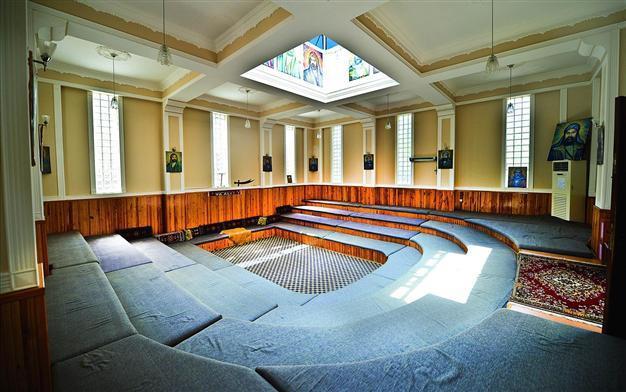Top court: It’s not judiciary’s call to designate cemevi as place of worship or not
ANKARA

A cemevi in Istanbul.
As Turkey’s public policies regarding cemevis, Alevi places of worship, have been labeled as discriminatory by the top European court on human rights, a Turkish court has made a landmark decision, stating that the determination on whether cemevis are places of worship or not cannot be made by the judiciary.
The Civil General Council of the Supreme Court of Appeals on Dec. 3 approved a local court’s decision, which reiterated in its January 2013 ruling that cemevis are places of worship, despite a ruling by the Supreme Court of Appeals overturning the lower court’s decision.
The Civil General Council approved the local court’s decision, rejecting the case appealing to close down the Çankaya Cemevi Construction Association.
Whether cemevis are places of worship or not cannot be decided by a judicial ruling, the Civil General Council said. It also ruled that an association can be founded to build cemevis.
Just a day before in Strasbourg, the European Court of Human Rights (ECHR) released its watershed ruling, stating Turkey’s public policies regarding cemevis discriminate against the Alevi community.
The Strasbourg-based court’s decision came on the agenda during the Civil General Council’s gathering, state-run Anadolu Agency reported, citing anonymous sources. The Council eventually ruled that building a cemevi is not against the European Convention on Human Rights, the agency said.
“Judicial rulings cannot be decisive on whether a place is place of worship or not. The individual himself/herself determines whether a place is place of worship or not,” the agency said, while quoting the idea prevailed during the Civil General Council meeting.
The Council also noted that their decision is not meant to “accept cemevis as places of worship,” as it is solely related to accepting that “an association can be founded for opening and building cemevis.”
At the time, the Ankara Chief Prosecutor’s Office had filed a suit against the Çankaya Cemevi Construction Association, which helps to build cemevis, on the grounds that the organization’s charter referred to Alevi cemevis as “houses of worship.”
But Ankara’s 16th Civil Court rejected the case file, saying: “For centuries, cemevis have been known and accepted as Alevi places of worship by society. The expression ‘cemevis are places of worship,’ ... is not illegal.” After the decision was appealed, the Court of Appeals took up the case file and reversed the judgment, agreeing with the prosecutor that charges should be pressed against the defendants on the grounds that only mosques and masjids could be considered places of worship.
The Çankaya Cemevi Construction Association’s charter includes articles that run counter to Turkish laws, the appeals court said. Yet in January 2013, the local court, again rejected the top court’s ruling and said in its reasoning that the state should be neutral toward Alevis’ preferences for worship, as is the case for other faiths.
